7th ALBA Summit
•
ALBA Demonstrates an Alternative to Imperialism Can Be Done!
•
Seventh ALBA Summit Prioritizes the Planet and Developing Nations
•
Social Summit in Cochabamba
•
SUCRE to Reduce Dependence on Dollar for Trade within ALBA
• ALBA: A Relevant Model
•
Venezuela’s Chavez Invites U.S. Labor Unions to ALBA
ALBA Demonstrates an Alternative to Imperialism Can Be Done!
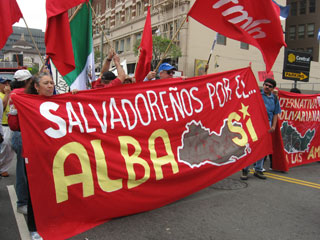 Voice of Revolution salutes the member countries of the Bolivarian Alliance for the Peoples of Our America (ALBA) on the successful conclusion of their 7th Summit. Despite U.S. efforts to organize coups and assassinations and generally denigrate ALBA and its member states, the alliance has developed and grown with great determination and courage. Member states of ALBA from South America include Venezuela, Bolivia and Ecuador, from Central America Nicaragua and Honduras, and from the Caribbean Cuba, Dominica, Antigua and Barbuda, and Saint Vincent and the Grenadines. Together they comprise a total population of more than 73 million people. What stands out is their fighting spirit and drive to develop relations of mutual respect and benefit and to stand shoulder to shoulder with the peoples rising against imperilaism and war. This can be seen in the various programs undertaken, such as the firm stand in support of resistance in Honduras, programs to provide free operations for correcting vision, oil at lower costs, programs eliminating illiteracy, opposing the U.S. Fourth Fleet and military bases in Colombia, and more.
Voice of Revolution salutes the member countries of the Bolivarian Alliance for the Peoples of Our America (ALBA) on the successful conclusion of their 7th Summit. Despite U.S. efforts to organize coups and assassinations and generally denigrate ALBA and its member states, the alliance has developed and grown with great determination and courage. Member states of ALBA from South America include Venezuela, Bolivia and Ecuador, from Central America Nicaragua and Honduras, and from the Caribbean Cuba, Dominica, Antigua and Barbuda, and Saint Vincent and the Grenadines. Together they comprise a total population of more than 73 million people. What stands out is their fighting spirit and drive to develop relations of mutual respect and benefit and to stand shoulder to shoulder with the peoples rising against imperilaism and war. This can be seen in the various programs undertaken, such as the firm stand in support of resistance in Honduras, programs to provide free operations for correcting vision, oil at lower costs, programs eliminating illiteracy, opposing the U.S. Fourth Fleet and military bases in Colombia, and more.
ALBA has developed in opposition to the interference and domination of U.S. imperialism, especially its imposition of free trade agreements and the brutal embargo and blockade of Cuba. ALBA reflects the desire of peoples everywhere to be sovereign and free from interference and domination by the big powers. The success of ALBA in resisting U.S. imperialism and fashioning its own institutions and finding a way forward is a concrete contribution to humanity and an inspiration to all those struggling for a pro-social alternative. ALBA has shown in practice that if those first brave steps are taken an alternative to the imperialist system of states can be done.
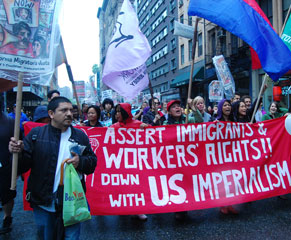 U.S. imperialism instigated the coup d’état in Honduras, a member state of ALBA, to thwart the development of the alternative and send a warning to all other countries of the Americas not to attempt to break free from U.S. dictate. The U.S. is striving to block everyone, including Americans, from taking the path of democracy and empowerment of the people. It is precisely the demand of the Hondurans to have a constituent assembly where the peoples themselves write a constitution that favors them that brought about the coup and the continued U.S. support for the coup government. ALBA stands as a block to these efforts and an arena where the peoples of the region can express their united stand.
U.S. imperialism instigated the coup d’état in Honduras, a member state of ALBA, to thwart the development of the alternative and send a warning to all other countries of the Americas not to attempt to break free from U.S. dictate. The U.S. is striving to block everyone, including Americans, from taking the path of democracy and empowerment of the people. It is precisely the demand of the Hondurans to have a constituent assembly where the peoples themselves write a constitution that favors them that brought about the coup and the continued U.S. support for the coup government. ALBA stands as a block to these efforts and an arena where the peoples of the region can express their united stand.
Together with the coup d’état in Honduras, U.S. imperialism is strengthening its military grip on the people of Columbia. It has announced plans for seven U.S. military bases, meaning more troops and weapons of mass destruction will be used against the Columbian people. The U.S. military occupation of Columbia is in part to protect U.S. economic plunder of Colombia through a free trade agreement signed in 2005. The annexed regime in Colombia is also being groomed as a U.S. military beachhead to threaten and control the rest of South America.
The Obama administration is also following war criminal Bush in activating the U.S. Navy’s Fourth Fleet in the waters of the Caribbean and Central and South America. The aggressive U.S. military actions and Honduras coup d’état are meant to terrorize the peoples of the Americas and stop them from joining and developing an alternative to oppression and imperialist exploitation, to intimidate them and convince them to abandon any thoughts of independence and freedom and give up their efforts to build the new.
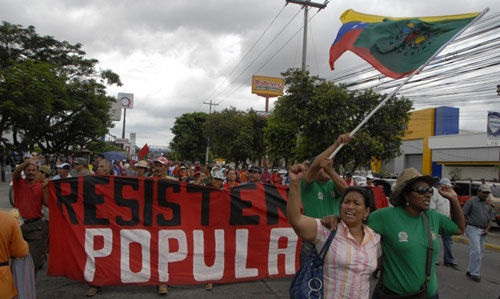
The 7th ALBA Summit condemned this intimidation and war maneuvers and elaborated their plans to carry on with actions that favor the people and thus undermine U.S. imperialism. Theirs is an internationalist spirit that refuses to submit to imperialist bullying and organizes for a pro-social, anti-war program.
On the economic front, ALBA members are strengthening their social solidarity through the Trade Treaty of the Peoples (TCP). They have pledged to practice trade amongst themselves based on mutual benefit and cooperation to build and develop the economies of each other. A great step in this direction is to free themselves from the tyranny of the U.S. dollar by establishing a virtual common currency amongst themselves to be used to resolve trade transactions. This means concretely that each country will require fewer U.S. dollars in reserve, a feature that will become a beacon for others worldwide. By objectively looking at trade as an institution of social solidarity and trust and for mutual benefit with the aim of developing the economies and living standards of all, the members of ALBA are able to pool their strong points and pass on those strengths to all members without exploiting the weaknesses of others but rather building each other up collectively. This is in sharp contrast to the unequal terms of trade and economic aggression within the imperialist system of states where weaker countries are at the mercy of the U.S.
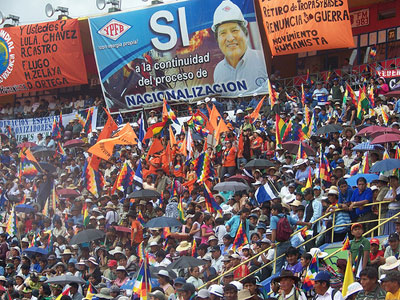 Voice of revolution calls on all to oppose all the U.S. free trade agreements, including NAFTA and those imposed bilaterally and to join in supporting and defending ALBA and all efforts to reject U.S. annexation and defend sovereignty. We demand all U.S. troops home now and the immediate removal of the Fourth Fleet, an instrument of aggression and war.
Voice of revolution calls on all to oppose all the U.S. free trade agreements, including NAFTA and those imposed bilaterally and to join in supporting and defending ALBA and all efforts to reject U.S. annexation and defend sovereignty. We demand all U.S. troops home now and the immediate removal of the Fourth Fleet, an instrument of aggression and war.
We extend our congratulations to the member states and peoples on the 7th Summit of the Bolivarian Alliance for the People’s of Our America and the Trade Treaty of the Peoples. The success of ALBA proves that an alternative to imperialism can be done!
[TOP]
Seventh ALBA Summit Prioritizes the Planet and Developing Nations
October 19, 2009 -The 7th Bolivarian Alliance for the Peoples of Our America (ALBA) Summit, from October 16-17, concluded with a call to respect the rights of “mother earth,” steps to apply the common currency “Sucre,” a meeting with social movement representatives, a proposal for a climate justice tribunal, and support for the legitimate president of Honduras, Manuel Zelaya.
Participating in the conference were presidents Evo Morales of Bolivia, Daniel Ortega of Nicaragua, Hugo Chavez of Venezuela, Rafael Correa of Ecuador, prime ministers Roosevelt Skerit of Dominica, Baldwin Spencer of Antigua and Barbuda, Ralph Gonsalvez of Saint Vincent and the Grenadines and the vice president of the Cuban Council of Ministers, José Ramón Machado Ventura.
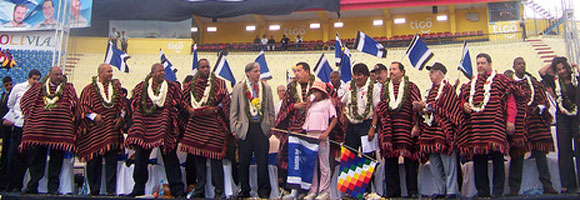
Sucre Currency and Trade
ALBA countries signed an agreement to implement the common currency “Sucre” (Unified System of Compensation of Reciprocal Payments). The point of the new currency is to use it instead of the U.S. dollar for commercial exchange between member countries.
Chavez, in his weekly column, emphasized that the currency constitutes a system of “fair trade” and distances Latin American countries from “hegemonic capitalism” and applauded that now, through ALBA, it is becoming a “tangible and concrete reality.”
The summit also agreed to create an export-import company, ALBAEXIM, in order to establish a mechanism for trade complementarity between ALBA countries. The final document convokes a range of ministers to meet and form “super-national” (gran-nacional) companies in sectors such as steel, geological mapping “of our resources,” energy, and forestry, and approves a plan of actions for commercial development in the economic zone of the Trade Treaty of the Peoples (TCP).
Climate Justice Resolution
Morales proposed the creation of a climate justice tribunal that judges and sanctions those who do not keep their environmental commitments. The final document said such a tribunal would also aim to make “developed countries pay their climate debt and effectively reduce their greenhouse gas emissions.” The tribunal will be made up of representatives of developing countries, “who will take on the task of judging those responsible for the climate crisis that our planet is living.”
Honduras
Regarding Honduras, ALBA resolved that no member country will allow any representatives of the de facto government to enter their country, and again demanded the restitution of President Manuel Zelaya, who was forcibly removed from his position during a coup in June. Chavez said, “I don’t know what’s going to happen in Honduras, but the people have a right to resist.” Then, speaking of Barack Obama, Chavez said the winner “of the Nobel Peace Prize needs to remember the seven bases in Colombia,” bases run by the United States as part of a policy that he said was “an attempt to convert Colombia into the Israel of Latin America.”
The Final Declaration
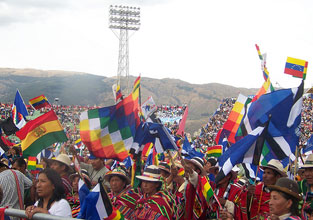 The 66-point final declaration approved by all member countries begins with an analysis and criticism of capitalism, its “maximum expression, imperialism,” climate change, the food crisis, the energy crisis and the financial crisis. Then it looks at how such crises can and should be solved or dealt with. Then it talks about migration, saying that it is not a crime and examining its causes. Next, it supports the strengthening of Latin American exchange and cooperation, and condemns the U.S.-run bases in Colombia and the U.S. economic blockade on Cuba.
The 66-point final declaration approved by all member countries begins with an analysis and criticism of capitalism, its “maximum expression, imperialism,” climate change, the food crisis, the energy crisis and the financial crisis. Then it looks at how such crises can and should be solved or dealt with. Then it talks about migration, saying that it is not a crime and examining its causes. Next, it supports the strengthening of Latin American exchange and cooperation, and condemns the U.S.-run bases in Colombia and the U.S. economic blockade on Cuba.
The second part of the document notes concrete agreements, ratifies the continuity of various cross-country programs such as the literacy program and the ALBA bank, gives instructions to different councils within ALBA (such as the social council, social programs, political council, economic council) to follow up various agreements and resolves to form a ministerial council of women and equal opportunities, as well as a sovereignty and defense council, to define “popular defense strategy” and form a School of Dignity and Sovereignty of the Armed Forces of ALBA countries.
Social Movements’ Participation
Two days before the heads of states started meeting, social movements began meeting in Cochabamba, as part of the ALBA conference and as one of the councils of the alliance.
There were over 700 delegates from 40 countries, who presented their final declaration to heads of state on Saturday in a large celebration in Stadium Felix Capriles in Cochabamba.
Second Round of Commerce
Telesur reported that Round II of Commerce also took place in Cochabamba to coincide with the ALBA Summit. It aims to promote more commercial exchange within Latin American countries. Bolivian and Venezuelan state-owned companies made an agreement involving around $100 million in intentions to buy.
In his weekly column, Chavez said the ALBA summit, rather than being just another summit, gives “continuity to, and matures the unity process.”
ALBA was created in 2004, initially just between Cuba and Venezuela, to counter U.S. free trade agreements and to normalize trade between Latin American countries.
The next ALBA summit will be held in Cuba, where it will commemorate its 5th anniversary.
[TOP]
The ALBA summit occurred in conjunction with a meeting of social organizations that gathered to collaborate on the development of ALBA and the “people’s trade agreements” being developed to put trade on the basis of mutual benefit rather than that imposed by the U.S., of domination and inequality.
ALBA was originally founded in December 2004 by the governments of Venezuela and Cuba. It has since grown to include Bolivia, Ecuador, Honduras Nicaragua, Dominica, St. Vincent and the Grenadines and Antigua and Barbuda.
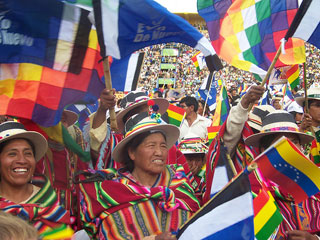 The ALBA initiative for Latin American integration is an alternative to the U.S. led “free trade agreements” in the region. Workers in the U.S., Canada, Mexico and Central and South America have all suffered the consequences of these agreements serving the U.S. monopolies. While the U.S. is organizing to increase its military bases in Colombia, has its fourth fleet of warships off the coast of Latin America and continues to impose unequal trade harmful to the economies of the region, ALBA is going forward with programs of mutual assistance. These include, for example, Cuba’s decision to send teams of doctors to Bolivia to provide free eye surgery and Venezuela’s efforts to increase its purchases of Bolivian textiles, following the repeal by the U.S. last year of trade preferences for those products. As well, Venezuela provides oil at lower costs. In addition, ALBA organizes the governmental summits together with social summits of organizations from the peoples’ movements. Far from blockading themselves behind fences and using police agencies to attack the people, ALBA summits include and encourage participation.
The ALBA initiative for Latin American integration is an alternative to the U.S. led “free trade agreements” in the region. Workers in the U.S., Canada, Mexico and Central and South America have all suffered the consequences of these agreements serving the U.S. monopolies. While the U.S. is organizing to increase its military bases in Colombia, has its fourth fleet of warships off the coast of Latin America and continues to impose unequal trade harmful to the economies of the region, ALBA is going forward with programs of mutual assistance. These include, for example, Cuba’s decision to send teams of doctors to Bolivia to provide free eye surgery and Venezuela’s efforts to increase its purchases of Bolivian textiles, following the repeal by the U.S. last year of trade preferences for those products. As well, Venezuela provides oil at lower costs. In addition, ALBA organizes the governmental summits together with social summits of organizations from the peoples’ movements. Far from blockading themselves behind fences and using police agencies to attack the people, ALBA summits include and encourage participation.
The Social Summit
Nearly 700 delegates participated in the social summit from 40 countries. The main hall of the hotel Casa de Campestre outside the city, where the meetings took place, buzzed with representatives from countries across the region and every manner of social concern, from women’s rights to protection of the planet.
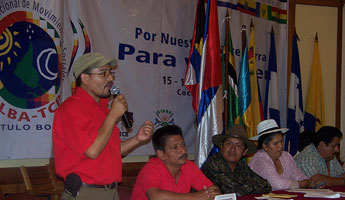 The social summit discussed a variety of subjects, including many of the same issues addressed by the heads of state at the governmental summit. Their conclusions are addressed not only to government but also to the people of the region and their respective countries.
The social summit discussed a variety of subjects, including many of the same issues addressed by the heads of state at the governmental summit. Their conclusions are addressed not only to government but also to the people of the region and their respective countries.
As reports from the summit indicate, “In some respects these social summits serve as incubators for ideas and debates that eventually find their way into the official summits. One clear example is the 2008 decision by the government of Bolivia to withdraw from participating in the secretive World Bank trade court (ICSID) that took jurisdiction over the Bechtel vs. Bolivia case in the aftermath of the Cochabamba Water Revolt.” The revolt opposed the privatization of water demanded by the World Bank, just as it had demanded privatization of Bolivia’s railways, telephone system, steel industry and airline. Struggle has continued against World Bank and IMF policies imposed against Bolivia and all the countries of the region. Part of this was the stand to leave ICSID. The call to do so was made in a previous social summit and then taken up by the Bolivian government.
The report continues, “Leaders of the Cochabamba social summit last weekend presented conclusions from the various issue roundtables that took place over two days – on women’s rights, indigenous autonomy, community development, climate change and other concerns. These reports were in turn presented to the ALBA Presidents on Saturday.
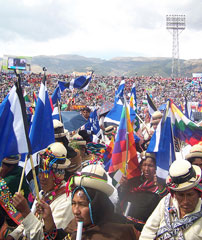 “An activist from Venezuela explained that the discussions in a roundtable on community economics focused on how to maintain ‘equality of working conditions and the maintenance of the environment; as well as the rural and indigenous production.’ Another participant from northern Bolivia said the right of indigenous communities to self-determination was vital, ‘so that we can determine our own norms and govern ourselves, with respect for Mother Earth.’ These social summits are where the seeds of initiatives in future government summits are planted.”
“An activist from Venezuela explained that the discussions in a roundtable on community economics focused on how to maintain ‘equality of working conditions and the maintenance of the environment; as well as the rural and indigenous production.’ Another participant from northern Bolivia said the right of indigenous communities to self-determination was vital, ‘so that we can determine our own norms and govern ourselves, with respect for Mother Earth.’ These social summits are where the seeds of initiatives in future government summits are planted.”
The report concluded, “It was encouraging to see lively and open debate around an international trade meeting. On Saturday afternoon the two summits came together in a packed soccer stadium under sunny skies. The stage in front was lined with Presidents and the stands pulsed with flags and banners. As the Presidents filled the afternoon air with speeches the representatives from social organizations stood united in the front rows. The two summits rallying together provided a hopeful sign of a new approach to governing and a challenge to a global order bent on serving only the rich.”
[TOP]
SUCRE to Reduce Dependence on
Dollar for Trade within ALBA
Venezuelan Minister of People’s Power for Commerce, Eduardo Saman recently remarked that when the Unified Regional Compensation System (SUCRE) comes into force, the economies of the member countries of ALBA will reduce their dependence on the dollar for their commercial exchange. ALBA countries are readying themselves to implement the SUCRE, thus assuring their governments will increase their economic and monetary sovereignty.
“[The SUCRE] helps us to reduce dependence on U.S. currency, because for large exchanges between ALBA nations, the dollar would not be used and it would minimize the dollar’s importance. Nobody would be after dollars, because they would not be needed, at least for large business deals,” Saman pointed out.
“For instance, if we purchase from Nicaragua $120 million worth of goods and services and they purchase from us $100 million, we would need $220 million dollars altogether, and the one printing them is the United States; therefore, our commerce depends on U.S. currency. With this new compensation system, Venezuela would only need $20 million to pay the difference to Nicaragua and if we trade the same sum of money, none of us would need to pay anything,” Saman explained.
The Minister of Commerce added that the regional currency would stimulate trade between ALBA nations: “Avoiding use of the dollar will promote trade in the region, which will result in an increase of commercial exchange between the countries that comprise ALBA.”
(Agencia Bolivariana de Noticias)
[TOP]
The results of the recently concluded 7th Summit of the Bolivarian Alliance for the Peoples of Our America-Peoples' Trade Agreement (ALBA-TCP) held in Cochabamba, Bolivia, show that it is possible to work for a new world economic order.
At a time when the international financial schemes have shown their unfeasibility, the agreement reached at the Alliance with regard to the Unitary System (instead of single-monetary system) for Regional Compensation (SUCRE for its Spanish acronym) that will come into force on January 1st, 2010, was very important.
Thus, the group made up by Venezuela, Cuba, Bolivia, Nicaragua, Saint Vincent and the Grenadines, Honduras, Ecuador, Dominica and Antigua and Barbuda, established a financial mechanism that will make it possible to give up dependence on the devalued U.S. dollar. Congratulations!
Of similar importance was the fact that this forum established the fundamental principles that will govern the Peoples' Trade Agreement (TCP) to develop regional trade based on complementary aid, solidarity and cooperation "to live well."
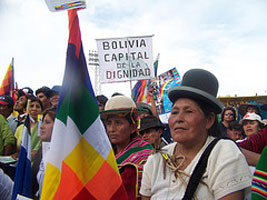 The document, an initiative of the summit's host, Bolivian President Evo Morales, is even more significant when compared to the negative effects the inclusion of Mexico in the North American Free Trade Agreement (NAFTA) with the United States and Canada has brought to Mexicans.
The document, an initiative of the summit's host, Bolivian President Evo Morales, is even more significant when compared to the negative effects the inclusion of Mexico in the North American Free Trade Agreement (NAFTA) with the United States and Canada has brought to Mexicans.
[The Summit] condemned the U.S. economic blockade of Cuba, when there are only a few days left for the debate that in this regard will take place at the UN General Assembly; it repudiated the coup d´état in Honduras, which was described as an attempt against the very same Alliance-Agreement; and rejected the presence of U.S. military bases in Colombia, a danger to The Americas.
At the end of the event, participating heads of state held a warm meeting with delegates at the 1st Summit of Social Movements, which carried out its sessions simultaneously — a fact that proves that joint work between political and social spheres is possible.
Two centuries after the first liberation cries in the homelands of Simon Bolivar and José Marti, the heads of state gathered in Cochabamba reaffirmed their commitment of moving forward to achieve independence, liberation, self-determination, and the union the Latin American and Caribbean peoples are claiming for.
These are elements proving the relevance of the ALBA model.
[TOP]
Venezuela’s Chavez Invites
U.S. Labor Unions to ALBA
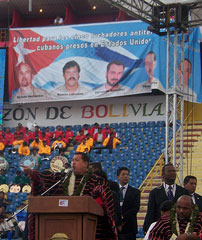 During a meeting with U.S. labor union leaders in New York September 23, Venezuelan President Hugo Chavez invited the unionists to participate in the fair trade integration bloc known as the Bolivarian Alliance for the Americas (ALBA), and he invited U.S. President Barack Obama to hold a “peace dialogue.”
During a meeting with U.S. labor union leaders in New York September 23, Venezuelan President Hugo Chavez invited the unionists to participate in the fair trade integration bloc known as the Bolivarian Alliance for the Americas (ALBA), and he invited U.S. President Barack Obama to hold a “peace dialogue.”
“Groups of unions, groups of workers from the United States, could incorporate themselves into the ALBA, because the ALBA has a council of social movements in addition to its council of presidents,” said Chavez in response to a participant who asked how U.S. and Latin American social movements could work together more.
“The ALBA, the Bolivarian Alliance, is much more than an alliance of governments,” the president explained. “We must fill it with people, from below, from the roots... because you are the ones who construct these alternatives.”
The ALBA was created in 2004 by Venezuela and Cuba to provide an organization for cooperation-based trade between countries as an alternative to the U.S.-dominated free trade agreements, and to promote regional integration on the basis of solidarity. The bloc now has nine members in South and Central America and the Caribbean.
Chavez told the U.S. unionists that Venezuela is not an enemy of the U.S., as the media portrays it to be. “One thing is the empire and another is the people of the U.S.,” he said. “We are enemies of imperialism, of hunger, of misery, of exploitation,” said the leader of Venezuela’s drive toward “21st Century Socialism.”
Turning his comments to the U.S. government, Chavez said he hopes to have a positive relationship with the Barack Obama administration, but that President Obama will have to assure that the actions his administration takes are in line with his call for “a new era of engagement,” made during a speech before the 64th U.N. General Assembly in New York.
“Sometimes one gets the sensation that there are two Obamas. One, who gave the speech, is good. The other makes decisions that are contradictory to his speech,” said Chavez. As an example, Chavez cited a recently signed deal to expand the presence of the U.S. military on seven Colombian bases. “If you promote peace, then why the seven military bases in Colombia?” he asked. He urged Obama, “Don’t send any more soldiers or war planes to Colombia, that is throwing gasoline on the fire, and that affects us all in South America.” He suggested instead, “Let’s talk about peace, let’s set up a peace dialogue.”
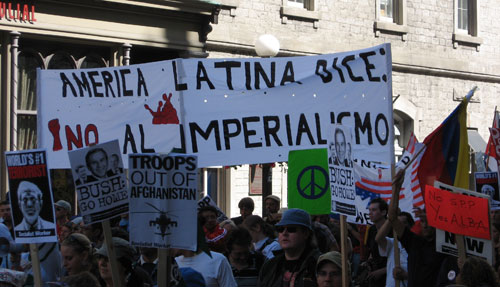
He added, “The world has begun to change, and the United States is part of the world, it cannot remain behind.” He emphasized that he is optimistic that the 21st Century will bring substantial improvements and that “the process of building unity cannot be detained.”
He said, “In the first ten years of the 21st Century, we have been able to advance on what could not be achieved in the two hundred previous years,” mentioning as examples the Union of South American Nations (UNASUR), the Bank of the South, and the Latin American television news station Telesur, in addition to the ALBA.
“The next ten years will be decisive,” he said. “I feel optimistic, and I ask all of you to feel optimistic and to struggle hard.”
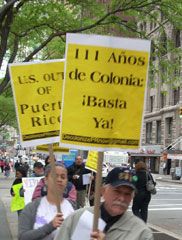 This struggle includes that of Puerto Rico to become an independent republic, said the Venezuelan leader, after recognizing that September 23rd is the anniversary of the day when Puerto Rican leaders declared the island independent from Spain in 1868. “Who said history has ended? History has re-begun,” Chavez said. “Someday, Puerto Rico will be a republic.” His comments were followed by strong applause.
This struggle includes that of Puerto Rico to become an independent republic, said the Venezuelan leader, after recognizing that September 23rd is the anniversary of the day when Puerto Rican leaders declared the island independent from Spain in 1868. “Who said history has ended? History has re-begun,” Chavez said. “Someday, Puerto Rico will be a republic.” His comments were followed by strong applause.
The meeting took place in the office of Venezuela’s ambassadorship to the United Nations. The participants included labor leaders from the national and multi-national electrical workers, food, automobile, public, and university sectors, as well as organizers of African-American and Puerto Rican unions.
[TOP]
